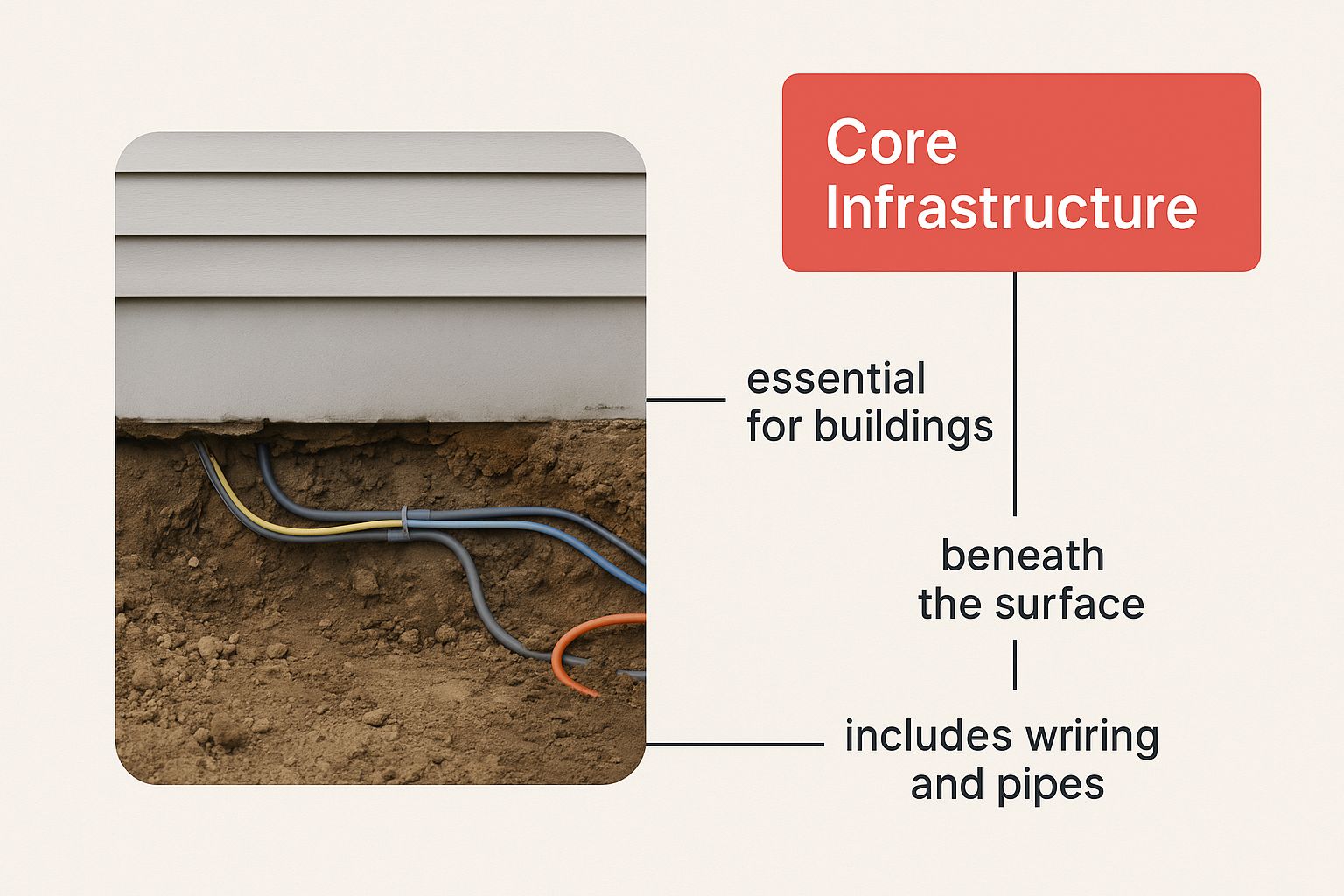Technical SEO Consulting: Your Blueprint for Success
Let’s be honest, technical SEO is the part of marketing that often gets overlooked. It’s not as glamorous as a viral social media campaign or a beautifully written blog post, but it’s the bedrock everything else is built on.
Think of your website like a brand-new, high-performance car. You can have the best engine, the most luxurious interior, and a stunning paint job, but if the chassis is warped and the electronics are haywire, you’re not going anywhere fast. Technical SEO is that chassis and wiring. It’s the invisible but absolutely essential framework that ensures your website actually performs.
Why Your Website's Foundation Matters
You can pour money into amazing content and clever link-building campaigns, but if search engines cannot find, crawl, and understand your pages properly, it is all for nothing. It’s like shouting into a vacuum.
This is where the distinction between the different parts of SEO becomes crucial. While on-page SEO is about the content itself and off-page SEO deals with your site's reputation across the web, technical SEO is purely about the mechanics. A technical SEO consultant is like a specialist engineer for your website, diagnosing and fixing the hidden issues that stop Google from giving your content the visibility it deserves.
This infographic breaks down how technical SEO serves as the core infrastructure for all your other digital marketing efforts.

Without this solid groundwork, the performance and visibility of your entire online presence are at risk.
To help clarify this, let's quickly compare the three core areas of search engine optimisation.
The Three Pillars of SEO Explained
| Pillar of SEO | Primary Focus | Example Activities |
|---|---|---|
| Technical SEO | Website and server optimisations (the "how") | Site speed, crawlability, indexing, structured data, security |
| On-Page SEO | Content and HTML source code optimisation (the "what") | Keyword research, content quality, title tags, meta descriptions |
| Off-Page SEO | Building authority and reputation (the "who trusts you") | Link building, brand mentions, social media signals, reviews |
Each pillar is vital, but technical SEO is the foundation that enables the other two to succeed.
The Growing Need for Technical Expertise
The demand for this specialism is not just a hunch; the numbers back it up. The UK's SEO and Internet Marketing Consultants industry has exploded, hitting a market size of around £20.7 billion in 2023 . This massive figure, detailed in a report from IBISWorld, shows just how seriously businesses are taking their digital presence.
This growth proves that more and more companies are realising that surface-level marketing just does not cut it anymore. To compete and win, your website has to be technically flawless. This is precisely why professional technical SEO consulting has become such a critical investment.
A website with a poor technical setup is like trying to have a conversation in a loud room. No matter how brilliant your message is, search engines and users will struggle to hear it.
At the end of the day, a technically sound website provides a better experience for your visitors, and that is something Google actively rewards with higher rankings. Neglecting it means you're just leaving traffic, leads, and revenue on the table for your competitors to grab.
If you're ready to make sure your foundation is solid, you can explore our full range of SEO services here.
Inside a Technical SEO Audit: What Consultants Uncover

Consultants do not just skim the surface. They get under the bonnet, scrutinising the underlying code, server settings, and site structure to see your website exactly how a search engine sees it. The end goal is simple: make sure crawlers like Googlebot can find, access, understand, and index your content without hitting any roadblocks.
Crawlability and Indexability
The first and most fundamental question a consultant asks is, "Can search engines even find your pages?" This starts with the robots.txt
file, which is basically a set of instructions for web crawlers. It is surprisingly easy to accidentally block important sections of your site here, making them invisible to Google.
Next up is your XML sitemap, which acts as a roadmap for search engines. A clean, up-to-date sitemap helps crawlers discover all your key pages efficiently. But if it is full of errors or points to dead pages, your best content might get missed entirely.
A website might have award-winning content, but if it is not crawlable or indexable, it is like a library with locked doors. No one can get inside to read the books.
Finally, consultants hunt for "crawl budget" waste. This is a real problem where search engine bots spend too much time crawling low-value pages (like old URLs or duplicate content), leaving less time to find and index the stuff that actually matters.
Site Architecture and Structure
The way your website is organised has a massive impact on both users and search engines. A logical structure, what we call site architecture, does more than just look neat—it helps spread "link equity" (or authority) throughout your site and makes it dead simple for visitors to find what they need.
A consultant will get forensic on:
- URL Structure: Are your URLs clean, descriptive, and logical? Or are they a jumbled mess of random characters? A good URL gives both users and Google instant context.
- Internal Linking: A smart internal linking strategy is like a tour guide, showing crawlers your most important pages and establishing a clear hierarchy. Broken internal links, however, are just dead ends.
- Website Navigation: They will check that your main navigation is intuitive and that your key pages are not buried deep in the site. A good rule of thumb is that anything important should be reachable within three clicks from the homepage. The journey of building a site is critical, which is why a solid understanding of why https://www.superhub.biz/website-development-explained-the-8-things-you-need-to-know-before-you-start is the first step.
Performance and User Experience
Technical SEO is not just about pleasing bots anymore. It is about delivering a fast, secure, and smooth experience for actual people. With Google's Core Web Vitals, this has become a direct ranking factor you simply cannot ignore.
Consultants will analyse your site's speed, mobile-friendliness, and security. They dig into everything from massive image files and slow server response times to ensuring your site uses secure HTTPS encryption. A key part of any technical audit is figuring out how to improve website loading speed.
Ultimately, a slow, clunky, or non-secure site is a fantastic way to damage your rankings and send potential customers running to your competitors.
From Audit Findings to Actionable Strategy
An audit report crammed with data is only the starting point. The real magic of technical SEO consulting happens when those raw findings are turned into a clear, prioritised roadmap that actually drives results for your business.
This is not a one-off event; it is a journey. It is about transforming a daunting list of issues into a strategic action plan, making sure every single change serves a purpose and lines up with your commercial goals. A great consultant plays two roles: first, the detective uncovering the root problems, and second, the architect designing the solutions.
The whole process is collaborative, right from the first chat through to getting the fixes live and monitoring the impact.
The Consulting Workflow Unpacked
A typical engagement follows a structured, logical path. This methodical approach ensures nothing gets missed and that you, the client, are kept in the loop at every critical stage. It is designed to move from a high-level understanding of your goals to the nitty-gritty of execution.
The usual steps look something like this:
- Discovery and Goal Setting: It all kicks off with a proper conversation to get under the skin of your business, your audience, and what success actually looks like for you. We are not just talking about traffic here—we are talking leads, sales, and brand authority.
- The In-depth Audit: As we have covered, this is the deep diagnostic phase. The consultant gets out their specialist tools and uses their expertise to scrutinise every technical corner of your website.
- Strategy Presentation: This is where the audit findings are translated from tech-speak into plain English. The consultant will walk you through a clear report, explaining not just what is wrong, but why it matters and the potential upside of fixing it.
- Prioritised Action Plan: This is the core deliverable—a roadmap that sorts all the recommendations by impact and effort. It will identify the quick wins you can tackle straight away alongside the bigger, long-term strategic fixes, giving you a clear path forward.
- Implementation and Collaboration: The final stage is putting that plan into action. This might involve the consultant making changes directly, but more often it means guiding your in-house development team with crystal-clear briefs and ongoing support.
From Data to Decisions
A good consultant does not just dump a spreadsheet of errors in your lap and walk away. They provide context and help you prioritise. For instance, fixing a critical crawl issue that is making half your site invisible to Google is always going to trump optimising a few image file names. This strategic thinking ensures your resources are focused where they will deliver the biggest return.
The goal of a technical SEO strategy is not just to fix errors; it is to build a resilient, high-performing digital asset that supports business growth for years to come. It is about creating a genuine competitive advantage.
This strategic role is getting the recognition it deserves. Within the UK's management consulting industry, technology consulting—which includes technical SEO advisory—now accounts for around 28% of the sector's £10 billion revenue. This highlights a massive shift where technical SEO is seen less as a simple marketing cost and more as a crucial business investment. You can discover more insights about the UK consulting industry on Consultancy.uk.
Often, a solid technical SEO foundation is what makes effective content scaling possible, ensuring all that valuable content you create actually reaches its intended audience. Ultimately, this structured workflow bridges the gap between complex technical data and measurable business outcomes, turning audit findings into a powerful engine for growth.
Understanding Deliverables and Measuring Success
When you bring in a technical SEO consultant, you are making an investment. So, what do you actually get for your money? It is a fair question. The answer is not just a bunch of abstract advice; it is tangible assets that give your digital strategy a clear path forward and show real, measurable progress.
The whole process usually wraps up with two key deliverables.
First up is the comprehensive audit report . This is much more than a simple list of errors. Think of it as a detailed diagnostic of your website’s health, complete with annotated screenshots, data visualisations, and plain English explanations of what each issue means for your business. It is the blueprint showing every crack in your site’s foundation.
The second deliverable is the prioritised roadmap , and this is arguably where the real value lies. A great consultant does not just dump problems in your lap; they translate the audit’s findings into a step-by-step action plan. This document carefully sequences fixes based on their potential impact versus the effort required, making sure you tackle the biggest wins first.
Defining What Success Looks Like
With this roadmap in hand, the focus shifts to tracking the real-world impact of these changes. Good technical SEO consulting is not about chasing vanity metrics. It is about moving the needle on Key Performance Indicators (KPIs) that directly affect your bottom line. Success is measured by concrete improvements in your website’s performance and health.
Here are some of the most important metrics to keep an eye on:
- Organic Traffic Growth: At the end of the day, the goal is to get more of the right people visiting your site from search engines. A successful campaign will deliver a steady, sustained increase in non-paid traffic.
- Keyword Ranking Improvements: Tracking your position for key search terms shows whether you are becoming more visible to the audience you actually want to attract.
- Crawl Error Reduction: This is a direct pulse check on your site's health. When crawl errors go down, it means search engines can navigate and understand your website far more efficiently.
- Core Web Vitals Scores: These user experience metrics (Largest Contentful Paint, First Input Delay, and Cumulative Layout Shift) are confirmed ranking factors. Improving them makes your site better for users and for Google.
Tracking Progress with Google Search Console
To monitor these KPIs, tools like Google Search Console are absolutely essential. It is your direct line to Google, giving you feedback on how the search engine sees your site, flagging issues, and tracking performance over time.
The performance report in Search Console, for example, gives you a crystal-clear view of your site's visibility in search results.
This dashboard lets you track clicks, impressions, and average keyword positions. It provides the hard data you need to measure the effectiveness of your consultant’s recommendations and prove your return on investment.
How to Choose the Right Technical SEO Consultant

Picking the right partner for your technical SEO consulting is a big deal. It is one of the most critical business decisions you will make. This is not just about hiring another supplier; it is about finding a partner you can trust, someone who shares your goals.
Get this right, and you can unlock serious growth. Get it wrong, and you are looking at a wasted budget and a whole lot of missed opportunities.
The trick is to see past the polished sales pitches and dig for real, tangible proof of their expertise. You need someone who can not only spot complex technical issues but can also explain them in a way that makes sense to you, always linking their recommendations back to your actual business goals.
Evaluate Proven Experience and Expertise
A consultant's track record is the clearest signal of what they can do. Do not just take their word for it—ask for the receipts. This means getting your hands on detailed case studies showing the problems they have faced, the fixes they implemented, and the real-world results they delivered for businesses like yours.
Testimonials and client references are gold. A quick chat with a past or current client gives you the unfiltered truth about their communication, reporting, and whether they actually deliver. Experience in your specific industry is a huge plus, as they will already get the unique challenges and competitive heat you are dealing with.
A great technical SEO consultant does not just present data; they tell a story with it. They explain the 'why' behind the 'what', ensuring you understand the strategic importance of every proposed change.
On top of that, a truly skilled consultant makes the complex simple. If they cannot explain an issue like crawl budget waste or schema markup in plain English, they are going to struggle to work effectively with your team. This knack for turning technical jargon into clear business actions is absolutely non-negotiable. For a wider view on this, our guide on how to choose a digital marketing agency might offer some useful pointers.
Assess Their Strategic Approach and Process
Beyond the technical chops, you need a partner with a solid game plan. A "one-size-fits-all" approach is a massive red flag. A real expert will want to dive deep into your business goals before they even glance at your website's code. Their strategy should feel like it was built just for you.
Of course, we have to talk about money. Pricing for technical SEO in the UK can vary wildly. You might see monthly retainers anywhere from £500 to over £5,000 , while one-off project fees can range from £1,000 to £30,000 . These numbers just reflect the huge variety in business needs and the depth of expertise required. You can get a sense of the broader market by exploring research on UK SEO consultants from MarketResearch.com.
This is where asking the right questions becomes your secret weapon.
To help you get started, we have put together a quick checklist of questions to ask any potential consultant. Use these to probe their methodology, understand their toolkit, and see how they prioritise what needs doing first.
Consultant Vetting Checklist: Key Questions to Ask
| Area of Enquiry | Sample Question | Why It's Important |
|---|---|---|
| Past Performance | "Can you walk me through a case study for a business similar to ours, detailing the results?" | This moves beyond claims to concrete proof. It shows they can solve problems relevant to your industry and deliver measurable ROI. |
| Strategic Thinking | "What is the first thing you would analyse to understand our business goals before starting a technical audit?" | This reveals if they are a true strategist or just a box-ticker. Their answer should focus on your business, not just your website. |
| Communication Style | "How would you explain the business impact of a canonicalisation issue to our marketing director?" | This tests their ability to translate complex technical jargon into clear, actionable business insights for non-technical stakeholders. |
| Prioritisation & Process | "How do you decide which recommendations to implement first? What does that process look like?" | A good consultant prioritises based on impact and effort. This question uncovers their project management and strategic thinking skills. |
| Tooling & Technology | "What is in your core toolkit, and why have you chosen those specific tools?" | This gives you insight into their level of sophistication and whether they invest in industry-standard tools to get the job done right. |
Their answers will quickly tell you whether you are talking to a genuine strategist or someone who just follows a checklist. Choose wisely.
Got Questions About Technical SEO?
Even after getting a clearer picture, it is completely normal to have a few more questions rattling around before you commit. This is where we tackle the common "what ifs" and "how longs" that pop up, giving you the straight answers you need to move forward with confidence.
We will cut through the jargon and get right to it, covering everything from project timelines to whether this kind of deep-dive support is overkill for a smaller business.
How Long Does a Technical SEO Project Actually Take?
This is a classic "how long is a piece of string?" question, but the answer really boils down to the size and complexity of your website. For a small business site, we can often get through the initial audit and patch up the most urgent issues within one to two months .
For a sprawling e-commerce platform with thousands of pages and years of technical baggage, you are looking at a different beast. The first phase might take three months alone, with ongoing work after that. The crucial thing to remember is that technical SEO is not a one-and-done job; it is a process of constant refinement. Your consultant’s roadmap will lay out a realistic timeline based on your specific setup.
A One-Off Audit or an Ongoing Retainer?
This is a big one, and the right choice depends entirely on your internal team and what you are trying to achieve long-term.
- One-Off Audit: This is perfect if you have a solid in-house dev team ready to take a clear plan and run with it. The consultant acts as the diagnostician, handing you the roadmap for your team to implement.
- Ongoing Retainer: This is the way to go if you do not have a dedicated technical team, or if your site needs constant TLC. The consultant effectively becomes an extension of your team, making sure fixes are implemented correctly and your strategy evolves with every new algorithm update.
An audit tells you what is broken. A retainer ensures it gets fixed properly and stays fixed, shifting you from putting out fires to proactively managing your website's health.
Is Technical SEO Consulting Really Worth It for Small Businesses?
Without a doubt. The scale might be smaller, but the rules of the game are the same. A small business website still needs to be fast, secure, and easy for Google to crawl if it wants to stand a chance in local search or a competitive niche.
In fact, for a small business on a tight budget, getting the technical foundations right is one of the smartest, most cost-effective moves you can make. Fixing one critical indexing problem could bring in more organic traffic than months of writing blog posts, delivering a massive return on a much smaller investment.
Ready to build a powerful foundation for your digital growth? The expert team at Superhub provides the strategic technical SEO consulting your business needs to thrive. Start your journey with us today.
Want This Done For You?
SuperHub helps UK brands with video, content, SEO and social media that actually drives revenue. No vanity metrics. No bullshit.



